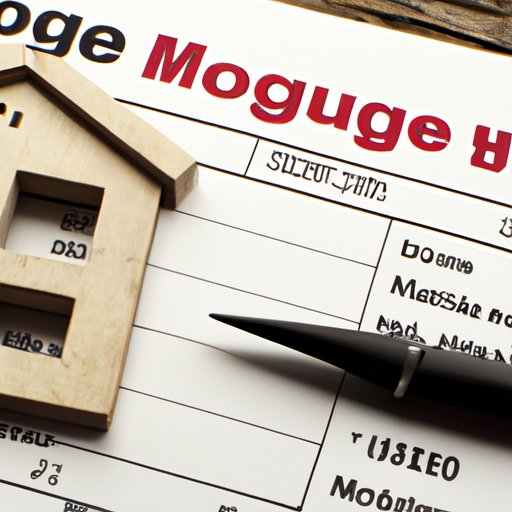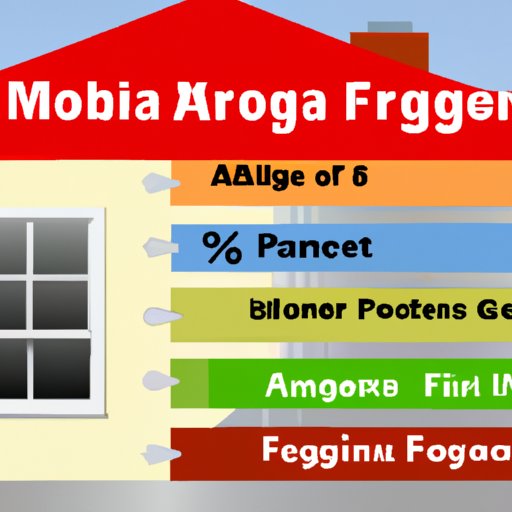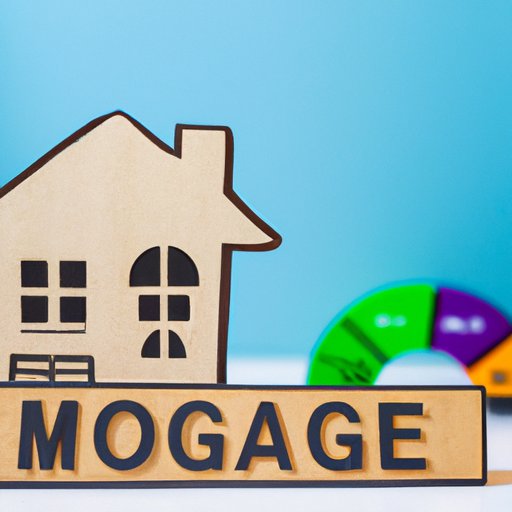Introduction
Buying a home is one of the most significant financial decisions you can make, so it’s important to understand exactly how much mortgage you can afford before you commit. Knowing your maximum mortgage affordability will help you make smart decisions and ensure that your house purchase doesn’t become a financial burden.
When considering your mortgage affordability, there are several factors that play into the equation. This article will provide an in-depth look at how to calculate your maximum mortgage amount, what to consider when determining how much house you can afford, and tips for choosing the right mortgage for your situation.
Calculating Your Maximum Mortgage Affordability
The first step in determining your maximum mortgage affordability is to calculate your gross income. This includes all sources of income, such as wages, dividends, alimony, child support, and investments. It’s important to include all sources of income, as they can all affect your ability to repay the loan.
Once you’ve calculated your gross income, you should also consider your existing debts and expenses. This includes any student loans, car payments, credit card bills, and other monthly payments. Subtract your total debts and expenses from your gross income to get a better picture of how much money you have available for a mortgage payment.
Finally, use this figure to determine the maximum mortgage amount you can afford. Generally speaking, lenders advise borrowers not to spend more than 28 percent of their gross income on housing costs. This means that if you make $4,000 per month, you should aim to spend no more than $1,120 on a mortgage payment.
What Can You Afford When Buying a Home?
Once you’ve calculated your maximum mortgage amount, you need to create a home affordability budget. Start by estimating your monthly housing costs, including your mortgage payment, property taxes, insurance, and any other fees associated with homeownership. Then subtract this figure from your gross income to get your remaining budget.
Next, analyze your personal financial situation to determine how much of your budget you’re comfortable spending on a mortgage payment. Consider your lifestyle, current debts, and any other financial obligations you may have. Also, take into account any changes you anticipate in your life in the near future, such as having children or starting a new job.
Finally, you should understand your credit score before you start shopping for a mortgage. A good credit score can help you qualify for a lower interest rate and save you money over the long term. If your credit score isn’t where you’d like it to be, consider taking steps to improve your credit before applying for a loan.
How Much House Can You Afford?
Once you have an idea of how much mortgage you can afford, you need to calculate your monthly payment. The amount of your down payment, the term of the loan, and the interest rate all affect your monthly payment. Use an online calculator or speak with a lender to get an accurate estimate.
You may need to adjust the mortgage amount to fit your budget. If the estimated monthly payment is too high, consider a longer loan term or a lower interest rate. On the other hand, if you can afford to pay more each month, you may opt for a shorter loan term or a higher interest rate.
It’s also important to understand how interest rates work. Interest rates can vary significantly depending on the type of loan you choose, so make sure you shop around to find the best deal. Keep in mind that the lowest interest rate may not always be the best option, as it could end up costing you more in the long run.

A Guide to Estimating Your Mortgage Budget
Once you’ve determined your maximum mortgage affordability, you need to calculate your total debt-to-income ratio. This is the percentage of your gross income that goes towards paying off debts each month. Most lenders look for a debt-to-income ratio of less than 43 percent, so make sure you stay within this limit when calculating your mortgage budget.
Property taxes and homeowners insurance are two additional costs that you’ll need to factor into your budget. These costs can vary significantly depending on where you live, so it’s important to research the cost of living in your area before committing to a loan.
Finally, you should account for any additional costs associated with buying a home. This includes closing costs, legal fees, moving expenses, and any renovations or repairs you plan to do. Make sure you have enough money set aside to cover these costs before signing on the dotted line.
How to Determine Your Mortgage Capacity
Once you’ve estimated your mortgage budget, it’s time to start thinking about getting pre-approved for a loan. To do this, you’ll need to provide documentation to prove your income and assets. This includes recent pay stubs, bank statements, and tax returns. You’ll also need to provide information about your current debts and credit history.
When submitting your loan application, you should explore different loan options. Fixed-rate mortgages offer predictable monthly payments, while adjustable-rate mortgages come with lower initial interest rates. Speak with a lender to determine which loan is best for your situation.

Factors That Impact How Much Mortgage You Can Afford
Your ability to secure a mortgage depends on several factors, including your income level, employment status, available down payment, and credit history. Generally speaking, the higher your income and credit score, the larger the mortgage you can afford. However, even if you have a lower income or credit score, you may still be able to get approved for a loan if you have a large down payment.

Tips for Choosing the Right Mortgage Amount
Choosing the right mortgage amount is ultimately a personal decision, but there are a few things you should keep in mind. First, prioritize comfort over prestige. Don’t be tempted to buy a more expensive home just because you can afford it. Instead, focus on finding a home that fits your budget and meets your needs.
Second, make sure you have an emergency fund. Even if you have a steady income and low debt-to-income ratio, unexpected expenses can arise. Having a sufficient emergency fund will help you stay afloat during rough patches.
Finally, don’t stretch yourself too thin. Once you’ve determined your maximum mortgage affordability, make sure you stick to it. Don’t let yourself be swayed by flashy homes or tempting loan offers. Instead, focus on finding a mortgage that fits your budget and lifestyle.
Conclusion
Determining how much mortgage you can afford is an essential part of the home buying process. To get started, calculate your gross income, debts and expenses, and maximum mortgage amount. Then create a home affordability budget and analyze your personal financial situation. Consider your credit score and loan options, and factor in additional costs such as property taxes and insurance.
By following these steps, you can make an informed decision about how much mortgage you can afford. Remember to prioritize comfort over prestige, maintain an emergency fund, and don’t stretch yourself too thin. With the right approach, you can find the perfect loan for your situation.
(Note: Is this article not meeting your expectations? Do you have knowledge or insights to share? Unlock new opportunities and expand your reach by joining our authors team. Click Registration to join us and share your expertise with our readers.)
